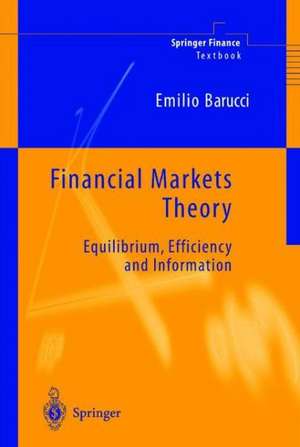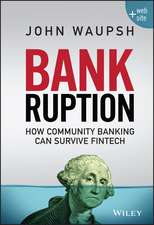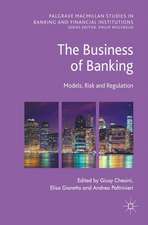Financial Markets Theory: Equilibrium, Efficiency and Information: Springer Finance
Autor Emilio Baruccien Limba Engleză Paperback – 21 oct 2012
| Toate formatele și edițiile | Preț | Express |
|---|---|---|
| Paperback (1) | 398.92 lei 6-8 săpt. | |
| SPRINGER LONDON – 21 oct 2012 | 398.92 lei 6-8 săpt. | |
| Hardback (1) | 506.25 lei 38-44 zile | |
| SPRINGER LONDON – 10 dec 2002 | 506.25 lei 38-44 zile |
Din seria Springer Finance
- 24%
 Preț: 703.47 lei
Preț: 703.47 lei - 24%
 Preț: 605.30 lei
Preț: 605.30 lei - 17%
 Preț: 361.15 lei
Preț: 361.15 lei - 24%
 Preț: 809.77 lei
Preț: 809.77 lei - 13%
 Preț: 359.67 lei
Preț: 359.67 lei - 18%
 Preț: 787.15 lei
Preț: 787.15 lei - 17%
 Preț: 398.82 lei
Preț: 398.82 lei - 15%
 Preț: 649.06 lei
Preț: 649.06 lei - 18%
 Preț: 937.37 lei
Preț: 937.37 lei - 15%
 Preț: 659.85 lei
Preț: 659.85 lei -
 Preț: 387.75 lei
Preț: 387.75 lei - 18%
 Preț: 1108.36 lei
Preț: 1108.36 lei - 15%
 Preț: 658.88 lei
Preț: 658.88 lei - 15%
 Preț: 651.19 lei
Preț: 651.19 lei - 18%
 Preț: 1112.60 lei
Preț: 1112.60 lei - 18%
 Preț: 937.86 lei
Preț: 937.86 lei -
 Preț: 418.34 lei
Preț: 418.34 lei -
 Preț: 398.15 lei
Preț: 398.15 lei - 15%
 Preț: 597.01 lei
Preț: 597.01 lei - 15%
 Preț: 637.89 lei
Preț: 637.89 lei - 18%
 Preț: 939.62 lei
Preț: 939.62 lei -
 Preț: 385.84 lei
Preț: 385.84 lei - 18%
 Preț: 892.90 lei
Preț: 892.90 lei -
 Preț: 395.25 lei
Preț: 395.25 lei - 15%
 Preț: 497.45 lei
Preț: 497.45 lei - 15%
 Preț: 632.19 lei
Preț: 632.19 lei - 18%
 Preț: 737.26 lei
Preț: 737.26 lei - 18%
 Preț: 801.17 lei
Preț: 801.17 lei - 15%
 Preț: 644.95 lei
Preț: 644.95 lei - 15%
 Preț: 593.55 lei
Preț: 593.55 lei - 18%
 Preț: 1207.45 lei
Preț: 1207.45 lei - 18%
 Preț: 810.81 lei
Preț: 810.81 lei -
 Preț: 391.61 lei
Preț: 391.61 lei - 19%
 Preț: 506.25 lei
Preț: 506.25 lei - 18%
 Preț: 957.62 lei
Preț: 957.62 lei -
 Preț: 387.75 lei
Preț: 387.75 lei - 15%
 Preț: 503.37 lei
Preț: 503.37 lei - 15%
 Preț: 593.91 lei
Preț: 593.91 lei -
 Preț: 383.71 lei
Preț: 383.71 lei
Preț: 398.92 lei
Nou
Puncte Express: 598
Preț estimativ în valută:
76.34€ • 80.06$ • 63.55£
76.34€ • 80.06$ • 63.55£
Carte tipărită la comandă
Livrare economică 01-15 aprilie
Preluare comenzi: 021 569.72.76
Specificații
ISBN-13: 9781447110934
ISBN-10: 1447110935
Pagini: 484
Ilustrații: XII, 467 p.
Dimensiuni: 155 x 235 x 25 mm
Greutate: 0.67 kg
Ediția:Softcover reprint of the original 1st ed. 2003
Editura: SPRINGER LONDON
Colecția Springer
Seriile Springer Finance, Springer Finance Textbooks
Locul publicării:London, United Kingdom
ISBN-10: 1447110935
Pagini: 484
Ilustrații: XII, 467 p.
Dimensiuni: 155 x 235 x 25 mm
Greutate: 0.67 kg
Ediția:Softcover reprint of the original 1st ed. 2003
Editura: SPRINGER LONDON
Colecția Springer
Seriile Springer Finance, Springer Finance Textbooks
Locul publicării:London, United Kingdom
Public țintă
ResearchCuprins
1 Prerequisites.- 1.1 Choices under Certainty.- 1.2 General Equilibrium Theory.- 1.3 Pareto Optimality.- 2 Choices under Risk.- 2.1 Expected Utility Theory.- 2.2 Risk Aversion.- 2.3 Portfolio Problem.- 2.4 Insurance Demand and Prudence.- 2.5 Notes, References and Exercises.- 3 Stochastic Dominance, Mutual Funds Separation and Portfolio Frontier.- 3.1 Stochastic Dominance.- 3.2 Mean-Variance Analysis.- 3.3 Portfolio Frontier (risky assets).- 3.4 Portfolio Frontier (risky assets and a risk free asset).- 3.5 Mutual Funds Separation.- 3.6 Notes, References and Exercises.- 4 General Equilibrium Theory and Risk Exchange.- 4.1 Risk Sharing and Pareto Optimality.- 4.2 Asset Markets.- 4.3 Intertemporal Consumption.- 4.4 The Fundamental Asset Pricing Theorem I.- 4.5 Notes, References and Exercises.- 5 Risk Premium: Capital Asset Pricing Model and Asset Pricing Theory.- 5.1 Capital Asset Pricing Model (CAPM).- 5.2 Empirical Tests of the CAPM.- 5.3 Arbitrage Pricing Theory (APT).- 5.4 Empirical Tests of the APT.- 5.5 Notes, References and Exercises.- 6 Multiperiod Market Models.- 6.1 Portfolio Choice, Consumption and Equilibrium.- 6.2 The Fundamental Asset Pricing Theorem II.- 6.3 Risk Premium and Factor Models.- 6.4 The No Arbitrage Fundamental Equation and Bubbles.- 6.5 Empirical Tests: Price-Dividend Process.- 6.6 Empirical Tests: CCAPM, ICAPM and Risk Premium.- 6.7 Notes, References and Exercises.- 7 Information and Financial Markets.- 7.1 The Role of Information in Financial Markets.- 7.2 On the Possibility of Efficient Markets.- 7.3 On the Impossibility of Efficient Markets.- 7.4 Multiperiod Models.- 7.5 Empirical Analysis.- 7.6 Notes, References and Exercises.- 8 Uncertainty, Rationality and Heterogeneity.- 8.1 Uncertainty, Risk and Probability.- 8.2 On Expected Utility Theory.- 8.3 Heterogeneous Agents and Substantial Rationality.- 8.4 Bounded Rationality, Incomplete Information and Learning.- 8.5 Imperfect and Incomplete Markets.- 9 Financial Markets Microstructure.- 9.1 The Role of Information under non-Perfect Competition.- 9.2 Order Driven Markets.- 9.3 Quote Driven Markets.- 9.4 Multiperiod Market Models.- 10 Corporate Finance.- 10.1 Modigliani-Miller Theorem.- 10.2 Asymmetric Information.- 10.3 Agency Models.- 11 Intermediation and Regulation.- 11.1 Institutional Investors, Intermediation and Financial Markets.- 11.2 Market Design.- 11.3 Market Abuse: Insider Trading and Market Manipulation.- References.
Caracteristici
Provides up-to-date economic perspective The only book to assess the how the empirical testing of financial markets has motivated research Ideal as a graduate textbook, with examples and exercises Also suitable as a handbook for practitioners Self-contained – tools for understanding the economic analysis are provided and mathematical models presented in discrete time/finite state space for simplicity
Descriere
Descriere de la o altă ediție sau format:
Financial Markets Theory presents classical asset pricing theory, a theory composed of milestones such as portfolio selection, risk aversion, fundamental asset pricing theorem, portfolio frontier, CAPM, CCAPM, APT, the Modigliani-Miller Theorem, no arbitrage/risk neutral evaluation and information in financial markets. Starting from an analysis of the empirical tests of the above theories, the author provides a discussion of the most recent literature, pointing out the main advancements within classical asset pricing theory and the new approaches designed to address open problems (e.g. behavioural finance). It is the only textbook to address the economic foundations of financial markets theory from a mathematically rigorous standpoint, and to offer a self-contained critical discussion, based on empirical results. Financial Markets Theory is an advanced book, well-suited for a first graduate course in financial markets, economics or financial mathematics. It is self-contained and introduces topics in a setting accessible to economists and practitioners equipped with a basic mathematical background. For those not acquainted with standard microeconomic theory, the tools needed to follow the analysis are presented early in the book. The approach makes this a vital handbook for practitioners in insurance, banking, investment funds and financial consultancy, as well as an excellent graduate-reference textbook.
Financial Markets Theory presents classical asset pricing theory, a theory composed of milestones such as portfolio selection, risk aversion, fundamental asset pricing theorem, portfolio frontier, CAPM, CCAPM, APT, the Modigliani-Miller Theorem, no arbitrage/risk neutral evaluation and information in financial markets. Starting from an analysis of the empirical tests of the above theories, the author provides a discussion of the most recent literature, pointing out the main advancements within classical asset pricing theory and the new approaches designed to address open problems (e.g. behavioural finance). It is the only textbook to address the economic foundations of financial markets theory from a mathematically rigorous standpoint, and to offer a self-contained critical discussion, based on empirical results. Financial Markets Theory is an advanced book, well-suited for a first graduate course in financial markets, economics or financial mathematics. It is self-contained and introduces topics in a setting accessible to economists and practitioners equipped with a basic mathematical background. For those not acquainted with standard microeconomic theory, the tools needed to follow the analysis are presented early in the book. The approach makes this a vital handbook for practitioners in insurance, banking, investment funds and financial consultancy, as well as an excellent graduate-reference textbook.














